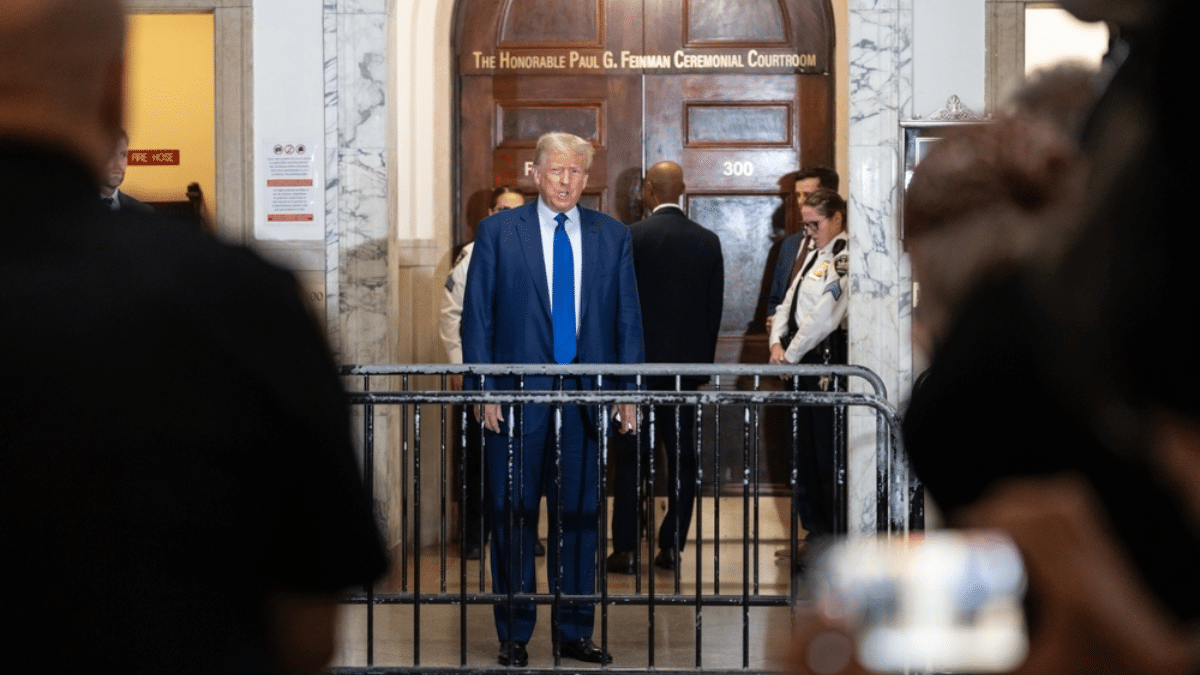The Former President’s Free Speech Should No Longer Trump Democracy
Anika Collier Navaroli / Nov 28, 2023
Former President Donald Trump addressed media before a second day of testimony in a civil fraud trial at New York State Court on October 25, 2023. Lev Radin/Shutterstock
Former President Donald Trump has been warned that his posts on Truth Social, the social media company run by Trump Media & Technology Group, could potentially incite violence or intimidate witnesses. After Trump did not heed judges’ warnings, they imposed gag orders, one of which was temporarily lifted this month, on First Amendment grounds.
Trump is once again towing the line with his speech, much like the last election. This time, however, it’s not happening on Twitter, where I worked as a senior policy official. Rather, it’s playing out in the courtrooms where Trump faces nearly 100 criminal counts, in addition to a civil fraud trial. Given that nearly one in four Americans believe political violence may be justified to save democracy, this sentiment, along with Trump’s inciting speech, is a dangerous and potentially deadly combination. But there are lessons to be learned from the saga of Trump’s speech on Twitter that can help point us toward a better future.
First, Trump should not be given special treatment by courts. For years, Twitter was accused of giving Trump preferential treatment on its platform. When I came forward as a Twitter whistleblower, I confirmed these allegations for the first time. According to my testimony to Congress, Twitter relished in the power of the president as a super user and gave him allowances not afforded to other users. In the courts, Trump has made arguments for his special treatment as a presidential candidate to continue and for him to be granted special privileges not typically given to typical defendants, including his request for the federal trial related to the plot to overturn the 2020 election be televised, despite the rules of criminal procedure generally prohibiting cameras in federal courtrooms.
Second, platform rules should not be broken for Trump. I also testified about how Twitter bent and broke its own rules to allow for Trump’s speech. Specifically, in 2019, in a series of tweets Trump told the Democratic members of Congress colloquially known as The Squad to go back to where they came from. Despite the phrase being a textbook violation of the company’s rules, Twitter did not implement a punishment. Going forward, platforms must swiftly take action if Trump or other politicians break the rules. When restoring his account, both Meta and YouTube claimed they would hold him to their community standards. That promise has yet to be tested.
Third, those in power should not wait to issue consequences until it’s too late. In the lead up to January 6th, I wasn’t the only person who warned Twitter’s leadership that things were amiss. Trump’s actions and language were so overt and public that on January 5th, Prince Harry emailed then Twitter CEO Jack Dorsey. He warned that Twitter was “allowing a coup to be staged.” Yet, as I told Congress, it wasn’t until Trump supporters were calling for additional violence days after the Capitol was attacked that Twitter finally removed the former president’s megaphone. In court, the lack of consequences for Trump’s speech can now be seen in his continued attacks on social media immediately following the lifting of his gag order.
To be clear, Trump, like all Americans, has a right to free speech. But that right is not absolute. As Trump has been told, the right to free speech comes with limits. One of the big limits to the First Amendment is a prohibition against incitement to imminent lawless action. Yet, it’s not hard to imagine why Trump might continue his language of shouting “will be wild!” in a social media echo chamber. Despite his numerous legal cases and a judge recently finding Trump “engaged in an insurrection,” he has not been removed from ballots or charged with incitement. Instead, the biggest consequence Trump has suffered for inciting the January 6 attack on the Capitol was perhaps temporarily losing his Twitter account.
I recently asserted that Trump’s current aversion to using X has lowered the threat of him inciting violence. However, the concern still remains, especially as Truth Social faces significant financial problems that threaten its existence. But for now, Truth Social’s slack content moderation has placed the burden of what to do about Trump’s speech onto American judges and government officials. They must reject the trap of treating his speech differently than any other defendant. Trump is not above the law, and he must still abide by the rules or face consequences, like all Americans. It’s time to use the lessons learned at Twitter and decide that the former president’s right to free speech can no longer trump the safety of human lives and democracy.
Authors
